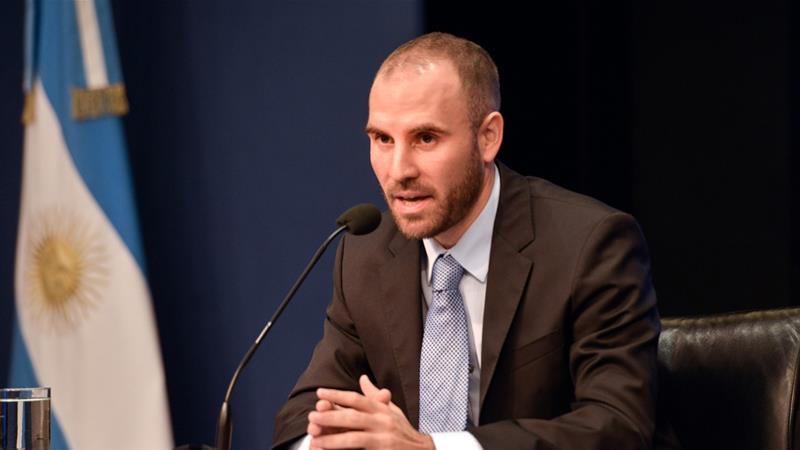Buenos Aires - Argentina's economy minister is sending a bill to Congress aimed at creating a legal basis for Latin America's third-largest economy to improve the terms of billions of dollars in loans. On Tuesday, he asked lenders to exhibit good faith as the new government seeks to fix a "profound" crisis.
"The situation today in Argentina is critical. We cannot sustain the debt load today, so we have to transform that [debt agreement] into something that is sustainable," said Minister of Economy Martin Guzman at a press conference in Buenos Aires. "We want to make promises we can keep."
Guzman's comments underscore newly elected President Alberto Fernandez's firm position on sovereign debt, as the administration tries to avoid another default. It continues talks with lenders and the International Monetary Fund (IMF).
The previous government of former President Mauricio Macri struck a $56bn bailout package with the IMF. Guzman describes that deal as a "huge failure" because it dramatically increased the South American country's debt, without increasing its "productive capacity" or its ability to repay the loan. Poverty soared under Macri, inflation in 2019 was more than 50 percent, and high interest rates destroyed businesses, said Guzman.
"The willingness to pay is there - we've always said that - but in order to pay we have to be able to generate capacity, and for that, we have to grow, and that's why it's fundamental that there be relief of the debt burden," he said.
The minister also announced that the national government has no intention of bailing out the province of Buenos Aires, which has asked bondholders for more time to pay a $250m principal payment due on January 26.
"What we're asking [of bondholders] is to give us the time that's necessary to resolve the macroeconomic breakdown that has affected the entire country," said Guzman.
The minister declined to comment on remarks made by his mentor, Nobel Prize-winning economist Joseph Stiglitz, at the World Economic Forum in Davos, Switzerland on Tuesday, regarding what investors might expect out of Argentina.
In order to pay we have to be able to generate capacity, and for that, we have to grow, and that's why it's fundamental that there be relief of the debt burden.Martin Guzman, Argentina's economic minister
"The reality is there will have to be significant haircuts," Stiglitz said at Davos, according to Bloomberg News.
By "haircut", Stiglitz means he believes Argentina will not pay back all of the money, interest or fees to which it initially agreed. "I cannot conceive of any reasonable model not saying that there has to be significant haircuts," the economist said. "It would be fantasy to think otherwise."
Guzman, who will be speaking next week at a Council of the Americas conference in New York City, told reporters that specific proposals will be presented at another time.
Argentina wants to improve at least two of the following three elements of its loans: debt terms, interest charges and capital amounts. The bill that Guzman recently sent to Congress creates a legal framework for the country to attempt to do so.
Martin Vauthier, an economist with the Buenos Aires financial consultancy firm EcoGo, said he would have liked to see those details fleshed out on Tuesday.
"What we're all waiting for is to know what the proposal is to restructure the debt," he told Al Jazeera. "It's what would enable the country to have some margin to manoeuver in other areas of its political economy. Now everything is basically in standby, awaiting this resolution."
Vauthier said the national government's refusal to pay the province of Buenos Aires' debt should send a strong signal to investors because the move not only strengthens the provincial government's request for more time from creditors, but it also highlights the federal government's fiscally prudent stance on the matter.
Argentine economist Gabriel Rubinstein agrees that it shows that both levels of government are on the same page. On the national level, he said, there also appears to be agreement on the part of the three key players - the country, bondholders and the IMF - on key aspects: that the country's economy has to grow, and it has to improve its fiscal situation.
The IMF has had "constructive" conversations with Argentina thus far, Kristalina Georgieva, the head of the IMF, said last week at an event at the Peterson Institute for International Economics in Washington.
"We are looking at doing what we can to be helpful to Argentina," said Georgieva, in a recording provided by an IMF spokesperson to Reuters. "We see eye to eye on the need to restore the economy and to address the increase in poverty that has affected negatively many Argentines."
And while much of the economic discourse so far has been conceptual, Rubinstein, who formerly served as a governor with Argentina's central bank, said it has been valuable.
"The government is showing signals of fiscal responsibility," he told Al Jazeera, taking note of government-expenditure choices and revenue from export retentions and taxes. "It's always better that there be signals, rather than not."
SOURCE: Al Jazeera News



